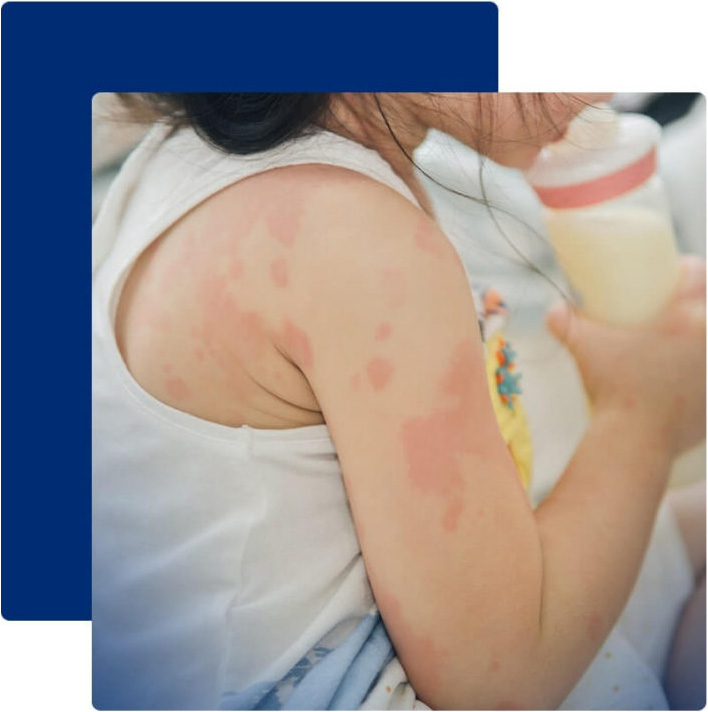- 24x7, 365 Days
- 101-103, Al Ameri Tower, Al Barsha Heights, Dubai, UAE
- +971 4 514 3255
- +971 52 331 6726
- inquiries@alphamedilab.ae

Food allergens have become a globally common infectious diseases around the world. Food-related allergies happen when chemicals come into contact with the body. For example, when your immune system mistakenly identifies proteins in certain foods as a threat, releasing chemicals that trigger an allergic reaction. Some of the most common food allergens can occur because of meat, medications, household chemicals, milk, wheat, tree nuts, fish, peanuts, eggs, soy, bee stings, and dust mites.
AML’s lab test practice for food allergens is a convenient and precise process to determine if you have any immune reaction to a specific food ingredient. We have a world-class clinic where highly qualified experts manage our clinical diagnostic and sample collection techniques.
We have DHA-licensed and certified healthcare professionals who collect your samples in the most professional, convenient, and hassle-free setting.
The symptoms of food allergy can be mild and severe for different people. However, it is rare, but sometimes, the symptoms can be life-threatening. Some of the common symptoms are as follows;

At AML, we have certified allergists and healthcare professionals who conduct a food allergy test on your sample after carefully determining the symptoms. Here are some of the food allergens tests we usually perform;

Skin Prick Test
The skin prick test is a process through which we determine if there are any allergic reactions in your body. The first process includes understanding the nature of symptoms and then placing a small amount of the suspected food item on the skin of your forearm or back. The allergist will then prick the skin with a needle to allow a tiny amount of food substance to get beneath the skin. If this step leads to a red, itchy bump on the injection point, it means that you are allergic to that food item.
Blood Test
The professional medical staff at AML conducts a blood test for food allergies to detect the substances called IgE antibodies in your blood. This is an allergy-causing substance. To perform this test, our certified and licensed expert will take a blood sample from a vein in your arm using a needle and collect your blood sample into a test tube. The process of managing your blood sample is convenient and ensures no pain.
Patch Test
The patch test is done on patients having eczema or dermatitis. For this test, our DHA-licensed nurse will place a few drops of allergens onto your arm’s skin and cover the area with a bandage. The test provider may also apply a patch that contains the allergen on your body and leaves it for some hours. Upon removing the bandage, if your skin has a rash or other reaction, you have a food allergy.
Some common food allergies develop in childhood but can also develop in adulthood in rare cases. Here are some of the common food allergies;
Egg Allergy
Children under the age of 16 usually develop an egg allergy, and the protein present in the egg develops an allergic reaction. The signs and symptoms of egg allergy include skin rashes, nasal congestion, some other digestive problems, etc.
Milk Allergy
Milk allergy happens to be the most common food allergy in infants, and it is also known as cows milk protein allergy, which quickly results as soon as your child consumes milk. The symptoms of a milk allergy range from mild to severe and can include diarrhea, vomiting, coughing, shortness of breath, and problem-related with the digestive system.
Dairy Allergy
This allergy involves the immune system. If someone has a dairy allergy, their body will eventually react to the proteins in milk while consuming other dairy products. The consumption releases the substances that cause allergy symptoms. The signs of a dairy allergy are rashes, loss of consciousness, and trouble breathing.
Seafood Allergy
Seafood allergy cause symptoms such as skin and gastrointestinal irritation. The allergic substance present in the fish, shellfish, shrimp, etc. causes this allergy and elevates the chances of getting this allergy.
Soy Allergy
Soy allergy is another common allergy in infants, and this allergy leads to a runny nose, rash, asthma symptoms, itchiness, etc. Children who have cows milk protein allergy may also develop soy allergy.


Choosing Alpha Medical Laboratory for food allergens ensures that best practices are adopted and accurate results will be shared with you. Here is why you should choose us;
When you get food allergy testing, the results will be given to you in a matter of hours. However, a patch test takes a few days, while the blood test consumes around a week longer.
The allergy test results may come in positive or negative. The meanings of both are as follows;
The subsequent steps depend on the nature of food allergens. Here are a few steps that are normally recommended to people having mild to severe allergic reactions;
Egg allergy has a moderate ratio. The medical experts at Alpha Medical Laboratory say that around 2% of children are allergic to eggs in their infancy. The signs and symptoms are mild to severe, depending on the nature of the reaction. The prominent signs are hives, swelling, difficulty in breathing, coughing, itching, redness in the eyes, etc. Moreover, it is recommended to about egg whites, egg yolks, dried eggs, and any substance containing eggs in its making.
Some signs and symptoms that make the need for undergoing food allergy testing are as follows;
AML is a trusted name when it comes to Laboratory Testing. We are here to take care of your testing needs with highest quality and proficiency following the Quality Management System of ISO 15189- 2012 .